YM 2.4 - The Greasy Pole
First airtime BBC: 16 March 1981
Length: 30 minutes
| Cast | Crew | |||
| Jim Hacker MP | Paul Eddington | Studio lighting | Derek Slee | |
| Sir Humphrey Appleby | Nigel Hawthorne | Costume designer | Jackie Southern | |
| Bernard Woolley | Derek Fowlds | Make-up artist | Cheryl Wright | |
| BBC News reader | Robert Dougall | Cameraman | Reg Pope | |
| BBC reporter | Lindy Alexander (?) | Film Editor | Alastair Mackay | |
| Joan Littler | Brenda Blethyn | Video tape editor | Sam Upton | |
| Sir Wally McFarlane | Freddie Earlle | Vision mixer | Joan Duncan | |
| Professor Henderson | Jerome Willis | Film Sound | Ron Blight | |
| Lord Crichton | Geoffrey Toone | Studio sound | Alan Machin | |
| Woman protester | Sheila Fay | Music | Ronnie Hazlehurst | |
| Mrs. Crichton | Maureen Stevens | Title sequence | Gerald Scarfe | |
| Production manager | Brian Jones | |||
| Design | Dacre Punt | |||
| Producer | Peter Whitmore | |||
| Writers | Antony Jay & Jonathan Lynn | |||
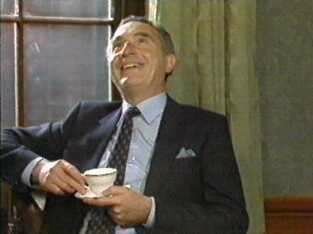 Plot: Sir Wally McFarlane, chairman of the government-owned British Chemical Corporation (BCC), is visiting Sir Humphrey. They discuss how to make sure that Jim Hacker will approve the production of propanol at the BCC's Merseyside plant. Propanol contains metadioxin, which has a bad reputation as dioxin causing a chemical disaster at Seveso, Italy in 1976. Sir Humphrey feels he might be able to convince the Minister himself, without the "tactful" approach of Sir Wally.
Plot: Sir Wally McFarlane, chairman of the government-owned British Chemical Corporation (BCC), is visiting Sir Humphrey. They discuss how to make sure that Jim Hacker will approve the production of propanol at the BCC's Merseyside plant. Propanol contains metadioxin, which has a bad reputation as dioxin causing a chemical disaster at Seveso, Italy in 1976. Sir Humphrey feels he might be able to convince the Minister himself, without the "tactful" approach of Sir Wally.
When Sir Humphrey brings the news about this new BCC contract to Jim Hacker, the Minister is delighted about the job creation, export orders and the possibility of increasing his popularity. He does however want to make sure that metadioxin is safe. Sir Humphrey assures him that it has been approved by the FDA in Washington, and that the DAA committee chaired by Professor Henderson will issue a safety report shortly.
Then Joan Littler, MP for Liverpool Southwest and the PM's Parliamentary Private Secretary, arrives to discuss this metadioxin contract. The BCC plant is in her (marginal) constituency, and she is very worried. During their discussion it turns out that nobody at the table really knows how safe or unsafe metadioxin is. Jim Hacker promises that he will not allow the chemical to be produced if the Henderson-committee casts any doubts. 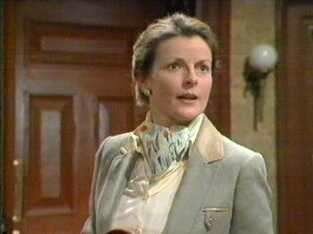 Joan Littler however is not satisfied with this promise and leaves the meeting.
Joan Littler however is not satisfied with this promise and leaves the meeting.
Jim Hacker now is worried that the Henderson-committee will produce a wait-and-see report. Sir Humphrey advises that in that case to publish the FDA report and discredit the Henderson report, using the well established government procedure for not publishing reports.
In the evening, the BBC news reports on the protest that has arisen regarding the propanol contract. Jim Hacker receives a phone call from Number Ten telling him to block the approval. He decides not to cross the PM on this, a decision Sir Humphrey is not very pleased with.
Sir Humphrey leaks the draft version of the Henderson report, which is positive about the safety of metadioxin.
The next day Sir Wally visits Jim Hacker and he is very assured that nothing can stop approval now the Henderson report is positive. Jim Hacker however does not want to approve it yet. This infuriates Sir Wally and he threatens to resign if this contract is blocked. Jim Hacker now feels that he is in such a position where regardless of the decision he makes, he will be hurt. He then thinks of visiting his old friend Lord Crichton, Provost at the college of Professor Henderson's.
While visiting Lord Crichton's tea-party Jim Hacker "coincidentally" bumps into Professor 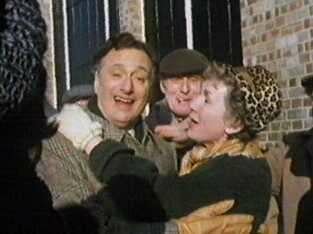 Henderson. Jim Hacker explains to Professor Henderson that his report will make him immortal, and he points out that if anything would go wrong in the future the press would crucify Professor Henderson. The Professor does not know what to do, but Lord Crichton helps him out to rewrite his conclusion in such a way that there is still doubt about the safety of metadioxin.
Henderson. Jim Hacker explains to Professor Henderson that his report will make him immortal, and he points out that if anything would go wrong in the future the press would crucify Professor Henderson. The Professor does not know what to do, but Lord Crichton helps him out to rewrite his conclusion in such a way that there is still doubt about the safety of metadioxin.
As soon as the Henderson report is published, Jim Hacker announces he will not approve the propanol contract. This decision makes him very popular with the public, and he views it as his best political decision so far. Sir Humphrey however thinks of it as the worst governmental decision ever witnessed.
Due to a slip of the tongue by Jim Hacker, Sir Humphrey finally begins to suspect that Jim Hacker had something to do with the rewriting of the conclusion of the Henderson report. The decision however stands.
Rating (0-10): 9
Top 5 Quotes:
 Jim Hacker: "Ministers are not experts. They are chosen expressly because they know nothing."
Jim Hacker: "Ministers are not experts. They are chosen expressly because they know nothing."
Sir Wally McFarlane: "You admit that?"
Jim Hacker: "Nothing about technical details." Joan Littler: "What I insist on knowing is what is the actual difference between dioxin and metadioxin."
Joan Littler: "What I insist on knowing is what is the actual difference between dioxin and metadioxin."
Sir Humphrey: "Well, that's quite simple. Metadioxin is an inert compound of dioxin."
Jim Hacker: "I think I follow that, Humphrey, but could you explain it a little more clearly?"
Sir Humphrey: "In what sense, Minister?"
Joan Littler: "What does inert mean?"
Sir Humphrey: "It means it is not......ert." Jim Hacker: "But you see, it's the public will. This is a democracy, and the people don't like it."
Jim Hacker: "But you see, it's the public will. This is a democracy, and the people don't like it."
Sir Humphrey: "The people are ignorant and misguided."
Jim Hacker: "Humphrey, it was the people who elected me." Jim Hacker: "How come the Times knows the wording of the Henderson report before I do."
Jim Hacker: "How come the Times knows the wording of the Henderson report before I do."
Bernard Woolley: "There has been a leak, Minister."
Jim Hacker: "I know that! This is marked Confidential, I mean I only got a draft report last night."
Bernard Woolley: "At least it was not labeled Restricted."
Jim Hacker: "Why do you say that?"
Bernard Woolley: "Restricted means it was in the papers yesterday. Confidential means it won't be in the papers until today." Jim Hacker: "Suppose he [Professor Henderson] produces one of these cautious wait-and-see reports?"
Jim Hacker: "Suppose he [Professor Henderson] produces one of these cautious wait-and-see reports?"
Sir Humphrey: "Well in that case we don't publish it, we use the American report instead."
Jim Hacker: "Oh fine. You mean we suppress it?"
Sir Humphrey: "Certainly not, we just don't publish it."
Jim Hacker: "What's the difference?"
Sir Humphrey: "Oh Minister, all the difference in the world. Suppression is the instrument of totalitarian dictatorship, we don't talk of that sort of thing in a free country. We simply take a democratic decision not to publish it."
YM 2.5 - The Devil You Know
First airtime BBC: 23 March 1981
Length: 30 minutes
| Cast | Crew | |||
| Jim Hacker MP | Paul Eddington | Technical manager | Paul Mason | |
| Sir Humphrey Appleby | Nigel Hawthorne | Studio lighting | Derek Slee | |
| Bernard Woolley | Derek Fowlds | Costume designer | Jackie Southern | |
| Sir Arnold Robinson | John Nettleton | Make-up artist | Cheryl Wright | |
| Annie Hacker | Diana Hoddinott | Cameraman | Mike Harrison | |
| George (Jim's driver) | Arthur Cox | Video tape editor | Steve Murray | |
| Vision mixer | Joan Duncan | |||
| Studio sound | Alan Machin | |||
| Music | Ronnie Hazlehurst | |||
| Title sequence | Gerald Scarfe | |||
| Production manager | Brian Jones | |||
| Design | Dacre Punt | |||
| Producer | Peter Whitmore | |||
| Writers | Antony Jay & Jonathan Lynn | |||
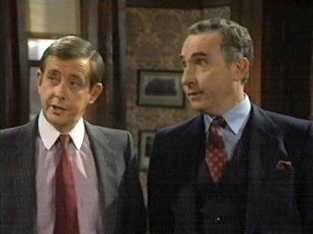 Plot: Jim Hacker is quite frustrated with a letter he received from the EEC in Brussels. While he was on the verge of announcing a big investment into British word processing equipment centrally bought by the DAA for other departments, Brussels asks him to conform to one standard to be agreed upon at an upcoming conference in Brussels.
Plot: Jim Hacker is quite frustrated with a letter he received from the EEC in Brussels. While he was on the verge of announcing a big investment into British word processing equipment centrally bought by the DAA for other departments, Brussels asks him to conform to one standard to be agreed upon at an upcoming conference in Brussels.
Although Jim Hacker is pro-Europe, he is definitely anti-Brussels in terms of bureaucracy. He thinks Sir Humphrey is in fact anti-Europe but pro-Brussels. Sir Humphrey points out however he is blaming the wrong people for receiving this letter. As it turns out, Basil Corbett (Minister for Trade and Industry, and feared by Jim Hacker as well as Sir Humphrey) warned Brussels about Hacker's investment plans.
The reason why, soon becomes clear: there is a rumour of a Cabinet reshuffle. Now Jim Hacker is terribly worried what will happen to him. He is not sure whether he has done all right as a Minister, although everyone says he has done all right.
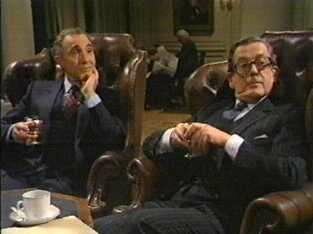 Later on that day Sir Humphrey meets Sir Arnold, the Cabinet Secretary. Sir Arnold informs that the EEC wants Jim Hacker to be the next British Commissioner. Furthermore there has also been talk of Jim's possible successor: Basil Corbett. Sir Humphrey is very unhappy with the idea of getting Basil Corbett as Minister.
Later on that day Sir Humphrey meets Sir Arnold, the Cabinet Secretary. Sir Arnold informs that the EEC wants Jim Hacker to be the next British Commissioner. Furthermore there has also been talk of Jim's possible successor: Basil Corbett. Sir Humphrey is very unhappy with the idea of getting Basil Corbett as Minister.
At home, Jim receives a phone call whether he would be available as an EEC Commissioner. He does not know what to make of this: whether the PM offers him a face-saving exit or it is purely a coincidence.
The next day Roy (Jim Hacker's driver) has some news about the reshuffle. He already knows that the Employment Secretary is going to be kicked upstairs. But the position of Jim Hacker is still a mystery. Even Bernard Woolley knows more about the reshuffle than Jim Hacker, although what will happen to Jim Hacker is unclear to him too.
Sir Humphrey has lunch with Sir Arnold, talking about the reshuffle. Sir Arnold points out that the 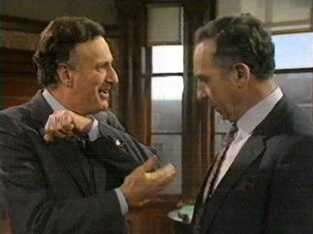 only way he can keep Basil Corbett away from the DAA is by creating a great success for Jim Hacker in the next few days. Then Sir Arnold can move Basil Corbett to the Department for Employment.
only way he can keep Basil Corbett away from the DAA is by creating a great success for Jim Hacker in the next few days. Then Sir Arnold can move Basil Corbett to the Department for Employment.
Sir Humphrey tells Jim Hacker about the meeting with Sir Arnold (omitting the part about Basil Corbett as Hacker's successor). Jim Hacker sees no chance to have a great success, so he decides to take the job in Brussels.
Then Sir Humphrey jumps up and advises Jim Hacker to ignore the EEC request and go ahead with the investment plans in British word processing equipment. Jim Hacker is enthusiastic; this will be a vote-winner and it will prove that he has elbows (meaning he is tough). He decides to follow this advise.
Jim Hacker inquires who would have been his successor at the DAA. Accidentally Bernard Woolley tells him it would have been Basil Corbett, and Sir Humphrey can only confirm.
Rating (0-10): 8½
Top 5 Quotes:
 Jim Hacker: "Europe is a community of nations, dedicated towards one goal."
Jim Hacker: "Europe is a community of nations, dedicated towards one goal."
Sir Humphrey: "Oh, ha ha ha."
Jim Hacker: "May we share the joke, Humphrey?"
Sir Humphrey: "Oh Minister, let's look at this objectively. It's a game played for national interests, it always was. Why do you suppose we went into it?"
Jim Hacker: "To strengthen the brotherhood of Free Western nations."
Sir Humphrey: "Oh really. We went in to screw the French by splitting them off from the Germans."
Jim Hacker: "So why did the French go into it then?"
Sir Humphrey: "Well, to protect their inefficient farmers from commercial competition."
Jim Hacker: "That certainly doesn't apply to the Germans."
Sir Humphrey: "No no, they went in to cleanse themselves of genocide and apply for readmission to the human race."
Jim Hacker: "I never heard such appalling cynicism. At least the small nations didn't go into it for selfish reasons."
Sir Humphrey: "Oh really? Luxembourg is in it for the perks; the capital of the EEC, all that foreign money pouring in."
Jim Hacker: "Very sensible central location."
Sir Humphrey: "With the administration in Brussels and the Parliament in Strasbourg? Minister, it's like having the House of Commons in Swindon and the Civil Service in Kettering." Sir Humphrey: "Shall we attend the conference in Brussels?"
Sir Humphrey: "Shall we attend the conference in Brussels?"
Jim Hacker: "What?"
Sir Humphrey: "Word processing.."
Jim Hacker: "Ah... well, does it take place before or after the reshuffle?"
Sir Humphrey: "Well, who can say?"
Jim Hacker: "Ah, well there you are, you see. No. I known this sort of thing happen before: one day you are out of your office, next day you are out of office." Jim Hacker: "Brussels is a shambles. You know what they say about the average Common Market official: he has the organizing ability of the Italians, the flexibility of the Germans, and the modesty of the French. And that's topped up by the imagination of the Belgians, the generosity of the Dutch and the intelligence of the Irish."
Jim Hacker: "Brussels is a shambles. You know what they say about the average Common Market official: he has the organizing ability of the Italians, the flexibility of the Germans, and the modesty of the French. And that's topped up by the imagination of the Belgians, the generosity of the Dutch and the intelligence of the Irish." [Talking about defying the word processing directive from Brussels]
[Talking about defying the word processing directive from Brussels]
Jim Hacker: "But we can't stab our partners in the back and spit in their face."
Bernard Woolley: "You can't stab anyone in the back, while you spit in their face." Jim Hacker: "The trouble with Brussels is not internationalism, it is too much bureaucracy."
Jim Hacker: "The trouble with Brussels is not internationalism, it is too much bureaucracy."
Sir Humphrey: "But the bureaucracy is a consequence of the internationalism. Why else would there be an English Commissioner with a French Director-General immediately below him, and an Italian Chef-du-Division reporting to the Frenchman and so on down the line."
Jim Hacker: "Oh, I agree."
Sir Humphrey: "It is like the Tower of Babel."
Jim Hacker: "I agree."
Sir Humphrey: "No, it's even worse, it is like the United Nations."
Jim Hacker: "I agree."
Bernard Woolley: "Then perhaps, if I may interject, you are in fact in agreement."
Jim Hacker & Sir Humphrey: "No we're not!"
YM 2.6 - The Quality of Life
First airtime BBC: 30 March 1981
Length: 30 minutes
| Cast | Crew | |||
| Jim Hacker MP | Paul Eddington | Properties buyer | Bob Sutton | |
| Sir Humphrey Appleby | Nigel Hawthorne | Assistant floor manager | Vivien Rosenz | |
| Bernard Woolley | Derek Fowlds | Studio lighting | Derek Slee | |
| Bill Pritchard | Antony Carrick | Costume designer | Jackie Southern | |
| Sir Desmond Glazebrook | Richard Vernon | Make-up artist | Cheryl Wright | |
| Peter (civil servant) | John Pennington | Cameraman | John Baker | |
| Sue Lawley | as herself | Film Editor | Alastair Mackay | |
| Sir Frank Gordon | Peter Cellier | Video tape editor | Steve Murray | |
| Mrs. Phillips | Zulema Dene | Vision mixer | Joan Duncan | |
| Crawford | Rex Robinson | Film Sound | Bob Roberts | |
| BBC producer | Roger Martin | Studio sound | Alan Machin | |
| Music | Ronnie Hazlehurst | |||
| Title sequence | Gerald Scarfe | |||
| Production assistant | Lesley Langan | |||
| Production manager | Brian Jones | |||
| Design | Dacre Punt | |||
| Producer | Peter Whitmore | |||
| Writers | Antony Jay & Jonathan Lynn | |||
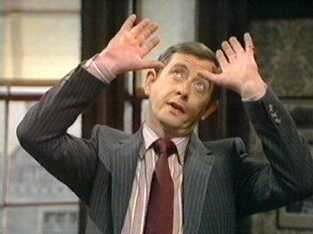 Plot: Sir Desmond Glazebrook wants to see Jim Hacker about his Bank's plan to put six more floors on top of the Bank's headquarters. He has a talk with Sir Humphrey before seeing the Minister, and Sir Humphrey points out that Jim Hacker just made a speech condemning high-rise buildings. Sir Humphrey assures that he will get building permission, but not right today.
Plot: Sir Desmond Glazebrook wants to see Jim Hacker about his Bank's plan to put six more floors on top of the Bank's headquarters. He has a talk with Sir Humphrey before seeing the Minister, and Sir Humphrey points out that Jim Hacker just made a speech condemning high-rise buildings. Sir Humphrey assures that he will get building permission, but not right today.
Jim Hacker's speech against high-rise buildings went down very well, and Bill Pritchard - the Minister's Press Officer - is showing Jim Hacker the results in the newspapers. Hacker however wants also to get his name in the mass-circulation newspapers (e.g. the Sun, the Daily Mirror, etc.). Bill Pritchard reminds Jim Hacker that all the newspapers will be present at Hacker's visit to a City Farm that afternoon. Hacker is very satisfied with this chance for good publicity.
After Bill Pritchard leaves, Jim Hacker sees Sir Desmond Glazebrook who explains the Bank's expansion plans. Jim Hacker is of course not very taken by this plan (since he just condemned high-rise buildings the night before), and Sir Humphrey helps out the Minister to point out the 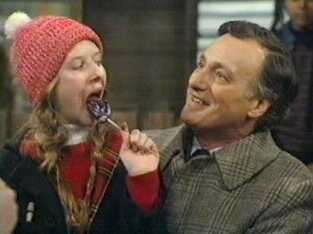 downsides of the plan. Furthermore, Sir Humphrey points out that the Bank has a vacant site that would accommodate its expansion plans. The Bank's architect however says that this site is scheduled for Phase III. Jim Hacker concludes the meeting by telling Sir Desmond Glazebrook that he most certainly will not give permission for six more floors.
downsides of the plan. Furthermore, Sir Humphrey points out that the Bank has a vacant site that would accommodate its expansion plans. The Bank's architect however says that this site is scheduled for Phase III. Jim Hacker concludes the meeting by telling Sir Desmond Glazebrook that he most certainly will not give permission for six more floors.
Then Jim Hacker has to rush to the City Farm. Sir Humphrey makes use of this hectic moment by asking for the Minister's signature for an Administrative Order to utilise unused local authority land. Jim Hacker is so rushed that he signs the Order without really knowing what he is signing. Then finally Jim Hacker goes off to the City Farm.
The visit is going splendidly; lots of reporters are present and Jim Hacker promises that the government will do all to help the City Farm movement to flourish. Even BBC television is present and Jim Hacker and Mrs. Phillips - the Warden of the City Farm - are interviewed. Mrs. Phillips 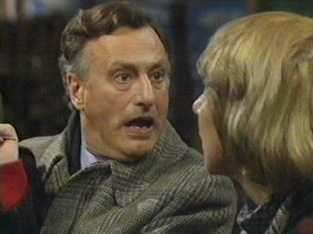 says that Jim Hacker has assured her that the lease of the City Farm will be renewed. Although Jim Hacker has not made such a concrete promise, he does not correct the statement of Mrs. Phillips. To sum up, the visit is a great success.
says that Jim Hacker has assured her that the lease of the City Farm will be renewed. Although Jim Hacker has not made such a concrete promise, he does not correct the statement of Mrs. Phillips. To sum up, the visit is a great success.
The next day, Sir Humphrey has lunch with Sir Frank Gordon, Permanent Secretary to the Treasury. Sir Humphrey tells Sir Frank that he can get hold of a piece of local authority land as new parking space for Inland Revenue Inspectors, because an Administrative Order has just been signed. As Sir Frank inquires what the land is being used for right now, it turns out it is the site of the City Farm that Hacker visited the day before.
Sir Humphrey also meets with Sir Desmond and together they cook up a plan to get building permission for the extra floors on the Bank's headquarters. 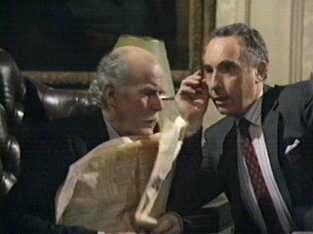 Jim Hacker is up till now unaware of what is going on, and very pleased with the publicity that his City Farm visit has received. Then Bernard Woolley tells him that Mrs. Phillips wants to see him because she has just learned that the Farm is being closed to make room for parking space for Inland Revenue Inspectors. She is furious and promises he will be roasted by all the national press.
Jim Hacker is up till now unaware of what is going on, and very pleased with the publicity that his City Farm visit has received. Then Bernard Woolley tells him that Mrs. Phillips wants to see him because she has just learned that the Farm is being closed to make room for parking space for Inland Revenue Inspectors. She is furious and promises he will be roasted by all the national press.
After she has left, Sir Desmond Glazebrook enters Hacker's office. He proposes a new building plan: if he would get permission for nine extra floors (instead of six), the Bank could postpone Phase III. This would leave the planned Phase III site vacant for other purposes, such as a City Farm. Jim Hacker jumps at this opportunity to save his image and agrees with nine extra floors for the Bank. Immediately a press release is published to announce this wonderful news...regarding the City Farm.
Rating (0-10): 9½
Top 5 Quotes:
 Sir Humphrey: "Didn't you read the Financial Times this morning?"
Sir Humphrey: "Didn't you read the Financial Times this morning?"
Sir Desmond Glazebrook: "Never do."
Sir Humphrey: "Well you're a banker, surely you read the Financial Times?"
Sir Desmond: "Can't understand it. Full of economic theory."
Sir Humphrey: "Why do you buy it?"
Sir Desmond: "Oh, you know, it's part of the uniform." Sir Humphrey: "Well, I wonder if you would be kind enough to sign this, Minister? It is extremely urgent."
Sir Humphrey: "Well, I wonder if you would be kind enough to sign this, Minister? It is extremely urgent."
Jim Hacker: "Do I have to? I'm late already."
Sir Humphrey: "Well yes, it is an Administrative Order."
Jim Hacker: "What is it for?"
Sir Humphrey: "Just formalizing government powers for the temporary utilization of unused local authority land until development commences, when it of course reverts to the authority."
Jim Hacker: "Do I have to sign it now?"
Sir Humphrey: "It is extremely urgent."
Jim Hacker: "Why hasn't it been before the House?"
Sir Humphrey: "Well of course, if it were a statutory instrument it would indeed have to be laid on the table of the House, but it is an Administrative Order made under Section 7 subsection 3 of the Environmental Administration Act, which is an enabling Section, empowering Ministers to make such regulations regarding unused local authority land as may appear necessary from time to time within the general framework of the Act, as I'm sure you recollect only to clearly."
Jim Hacker: "Why doesn't it have to go before the House?"
Sir Humphrey: "Well as I say, if it were a statutory instrument it would in fact have to be laid on the table of the House, but as it is an Administrative Order made under Section 7 subsection 3...."
Jim Hacker: "All right, all right, Humphrey, I have signed it." Bill Pritchard: "The Sun specifically asked if you could be photographed amongst the donkeys."
Bill Pritchard: "The Sun specifically asked if you could be photographed amongst the donkeys."
Jim Hacker: "I'm not sure about the donkeys. What do you think, Bernard?"
Bernard Woolley: "Well even if the Sun has no ulterior motive, it will be a gift for Private Eye: You with a crowd of other donkeys. I mean, that's what they would say, Minister. Or: A meeting of the inner-Cabinet." [Talking about the Bank's building plans]
[Talking about the Bank's building plans]
Jim Hacker: "I see, it's just profits, isn't it, Sir Desmond?"
Sir Desmond Glazebrook: "Not just profits, it's profits."
Jim Hacker: "Don't you think of anything but money?"
Sir Desmond: "No, why?"
Jim Hacker: "What about beauty?"
Sir Desmond: "Beauty? This is a building, not an oil painting."
Jim Hacker: "And the environment?"
Sir Desmond: "Oh yes, I promise you we'll make sure it is part of the environment. It is bound to be once it's there, isn't it?" Sir Desmond Glazebrook: "Surely once a Minister has made his decision, that's it, isn't it?"
Sir Desmond Glazebrook: "Surely once a Minister has made his decision, that's it, isn't it?"
Sir Humphrey: "What on earth gave you that idea?"
Sir Desmond: "Surely a decision is a decision."
Sir Humphrey: "Only if it is the decision you want. If not it is just a temporary setback."
YM 2.7 - A Question of Loyalty
First airtime BBC: 6 April 1981
Length: 30 minutes
| Cast | Crew | |||
| Jim Hacker MP | Paul Eddington | Studio lighting | Derek Slee | |
| Sir Humphrey Appleby | Nigel Hawthorne | Costume designer | Jackie Southern | |
| Bernard Woolley | Derek Fowlds | Make-up artist | Cheryl Wright | |
| Peter (civil servant) | John Pennington (uncredited) | Video tape editor | Graham Sisson | |
| Betty Oldham | Judy Parfitt | Vision mixer | Joan Duncan | |
| Sir Mark Spencer | Nigel Stock | Studio sound | Alan Machin | |
| Civil Servant | Rosemary Williams | Music | Ronnie Hazlehurst | |
| Committee chairman | Anthony Dawes | Title sequence | Gerald Scarfe | |
| Committee member | John Rolfe | Production manager | Brian Jones | |
| Design | Tony Burrough | |||
| Producer | Peter Whitmore | |||
| Writers | Antony Jay & Jonathan Lynn | |||
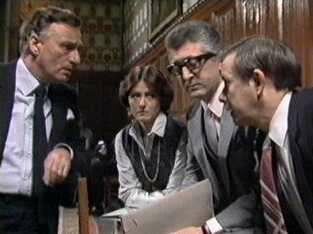 Plot: Jim Hacker has just returned from Washington were he held a speech about the marvelous efficiency of the British Civil Service and its ruthless war on waste. Sir Humphrey was very pleased with this speech because it forces the Minister to defend the department before Parliament, like the Select Committee hearing that is coming up the next day. Sir Humphrey has prepared a brief for the hearing that carefully presents the department's position.
Plot: Jim Hacker has just returned from Washington were he held a speech about the marvelous efficiency of the British Civil Service and its ruthless war on waste. Sir Humphrey was very pleased with this speech because it forces the Minister to defend the department before Parliament, like the Select Committee hearing that is coming up the next day. Sir Humphrey has prepared a brief for the hearing that carefully presents the department's position.
When Jim Hacker is in front of the Select Committee, Betty Oldham - MP for Derbyshire East - confronts him with a number of appalling cases of waste within the DAA. She got these cases from a book by Malcolm Rhodes, who formerly worked as an assistant secretary in the DAA. Jim Hacker does not know how to respond to these allegations and he just says that he will have it looked into. Another Committee member wonders whether Sir Humphrey might not be the appropriate person to answer to these allegations and Jim Hacker fully agrees.
Sir Humphrey is not very pleased by this. As soon as he appears in front of the Select Committee he gives an explanation for every case of government waste. But every 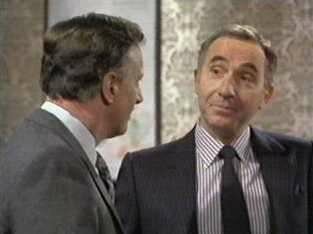 time that Betty Oldham tries to get his views how government policy should be changed, he refers back to Jim Hacker since the Minister is responsible for government policy.
time that Betty Oldham tries to get his views how government policy should be changed, he refers back to Jim Hacker since the Minister is responsible for government policy.
His appearance before the Committee has not solved anything and both Sir Humphrey and Jim Hacker are scheduled to appear before the Committee together a few days later. Sir Humphrey and Jim Hacker agree that they have to cook up a good story together, using one of the five standard excuses.
Then Jim Hacker is invited to Number Ten were he has a meeting with the PM's Special Advisor, Sir Mark Spencer. In this meeting Jim Hacker learns that Betty Oldham got hold of the book by Malcolm Rhodes through Sir Mark Spencer. The PM is trying to achieve cuts in government spending but all Ministers are house-trained by the Civil Service. The PM is therefore not pleased by Jim Hacker's appearance before the Select Committee because he is protecting the Civil Service. 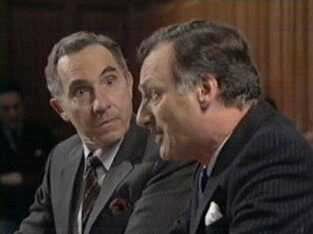 Sir Mark Spencer advises Jim Hacker to be absolutely loyal (to whom is Jim Hacker's decision).
Sir Mark Spencer advises Jim Hacker to be absolutely loyal (to whom is Jim Hacker's decision).
As Sir Humphrey and Jim Hacker together appear before the Select Committee, Sir Humphrey presents the correct official reply (an excuse). Then Jim Hacker drops his support for this excuse and admits that changes are necessary within the department and that he has asked Malcolm Rhodes to head up an independent outside inquiry of the DAA. Sir Humphrey is of course shocked and very angry with the Minister.
Back at the DAA he tells the Minister that the department is up in arms and that the PM will be very angry about Jim Hacker's public admittance of failure. Jim Hacker receives a praising letter from the PM, and then Sir Humphrey realises that this was a conspiracy against the Civil Service.
Rating (0-10): 9
Top 5 Quotes:
 Betty Oldham: "Look, Sir Humphrey, whatever we ask the Minister, he says is an administrative question for you, and whatever we ask you, you say is a policy question for the Minister. How do you suggest we find out what is going on?"
Betty Oldham: "Look, Sir Humphrey, whatever we ask the Minister, he says is an administrative question for you, and whatever we ask you, you say is a policy question for the Minister. How do you suggest we find out what is going on?"
Sir Humphrey: "Yes, yes, yes, I do see that there is a real dilemma here. In that, while it has been government policy to regard policy as a responsibility of Ministers and administration as a responsibility of Officials, the questions of administrative policy can cause confusion between the policy of administration and the administration of policy, especially when responsibility for the administration of the policy of administration conflicts, or overlaps with, responsibility for the policy of the administration of policy."
Betty Oldham: "Well, that is a load of meaningless drivel. Isn't it??" Sir Humphrey: "There is the excuse we used for the Munich Agreement: It occurred before certain important facts were known, and couldn't happen again."
Sir Humphrey: "There is the excuse we used for the Munich Agreement: It occurred before certain important facts were known, and couldn't happen again."
Jim Hacker: "What important facts?"
Sir Humphrey: "Well, that Hitler wanted to conquer Europe."
Jim Hacker: "I thought that everybody knew that."
Sir Humphrey: "Not the Foreign Office." Jim Hacker: "Tiny mistake? 75,000 pounds [wasted]! Give me an example of a big mistake."
Jim Hacker: "Tiny mistake? 75,000 pounds [wasted]! Give me an example of a big mistake."
Sir Humphrey: "Letting people find out about it." Sir Humphrey: "He that would keep a secret, must keep it secret that he has a secret to keep."
Sir Humphrey: "He that would keep a secret, must keep it secret that he has a secret to keep."
Jim Hacker: "Who said that?"
Bernard Woolley: "It was Sir Humphrey." Jim Hacker: "But Humphrey, if these revelations are true..."
Jim Hacker: "But Humphrey, if these revelations are true..."
Sir Humphrey: "Ah exactly, Minister, IF... You could for instance have discussed the nature of truth.
Jim Hacker: "The Committee isn't the least bit interested in the nature of truth. They're all MPs!"
